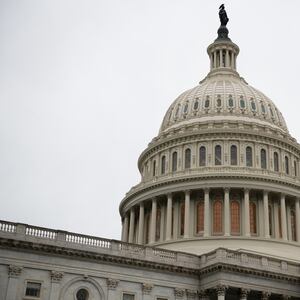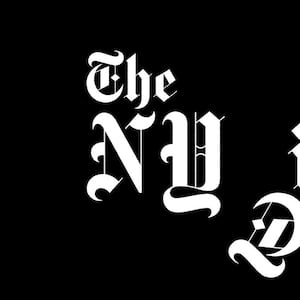The union representing a growing number of the biggest news organizations in the country now faces one of its most daunting challenges in years as powerful members from its largest unit, The New York Times, are delaying and attempting to scuttle the union’s plans to raise dues.
Last month, the NewsGuild of New York—the media union that counts staffers at the Times, Reuters, BuzzFeed News, The Daily Beast, and numerous other outlets among its members—announced plans to hold an election to raise member dues. The union painted a dire picture: Members needed to vote to approve a dues increase in order to avert a possible financial catastrophe that would include a reduction in NewsGuild services, including staffing, legal support, and new organizing drives.
The proposal, which would require an increase of dues from 1.3846 percent to 1.75 percent, and end the cap on dues for those making more than $140,000 per year, sparked dissension from dozens of top members from the Times, who have joined together with some Guild members from Reuters. This group has sought advice from prominent labor attorney Arthur Schwartz to explore their options in opposing the increase.
A contingent of more than 100 New York Times staffers signed a letter to the union opposing its proposals for raising cash. That petition, which has been shared widely in media circles, included the signatures of the newspaper’s Pulitzer Prize-winning journalists including Maggie Haberman, Jodi Kantor, Megan Twohey, Matthew Rosenberg, Emily Steel, William Rashbaum, Mark Mazzetti, David Sanger, Michael Rothfeld, Eric Lipton, Mike McIntire, Michael Shear, Michael Paulson, Wesley Morris, Sharon LaFraniere, Steve Eder, and Adam Goldman, as well as other star reporters like Jonathan Mahler, Katie Rosman, Ben Protess, Kenneth Vogel, Rebecca Ruiz, Jonathan Martin, Mark Leibovich, Kim Barker, Cecilia Kang, Nellie Bowles, Trip Gabriel, and several journalists from Reuters.
“For now, the Guild’s existing dues-paying members—you—are paying for this expansion effort with no clear projections for how much it will cost nor when new dues will begin to sluice into our coffers,” stated the petition, which was reviewed by The Daily Beast.
“Guild’s leaders have provided few details, other than to say they plan to hire more organizers. In fact, a top Guild official recently told us the Guild never writes a budget that extends more than one quarter ahead and that there is no ‘reliable way to predict’ future revenues and costs,” the petition continued. “That is an alarming response. No business looking to expand would simply shrug its collective shoulders and say: ‘Revenues? Costs? Sorry, no real idea…’
“Rather than give the Guild a blank check to spend more of our money, we need to consider a proposal for higher dues in a careful accounting of likely costs and revenues,” the letter added.
Vanity Fair first reported last month on discontent about the move inside the Times and Reuters newsrooms, but the tensions came to a head this week with the circulation of a letter signed by some of the most well-known Times reporters and in a tense Wednesday evening town-hall meeting. (Disclosure: This story’s reporters are members of the NewsGuild, and were previously privy to some unreported details of the dues-increase proposals. Every detail of this story was confirmed independently.)
The battle pits Times reporters and editors skeptical of the NewsGuild’s spending against other Guild members frustrated by the unwillingness of largely well-paid journalists to sacrifice a small amount for their colleagues in the industry.
“These are people who don't give a shit about actually helping other people. It’s the most Times-y form of liberalism you can think of,” Alex Shepherd, unit chair at The New Republic, who is on the Guild’s executive committee, told The Daily Beast. “Someone who lives in Montclair, N.J., your career has benefited tremendously from the work The Guild has done. You can pay for it and it helps your future colleagues. Especially at a time our industry is fucking calamitous. It seems to be lost on these people as they live in this gilded palace. These people don’t have any sense of solidarity with their colleagues.”
“Half of every dollar the Guild spends on organizing comes out of the paychecks of New York Times unit members,” Stacy Cowley, a business reporter and vice-chair of the NYT Unit Council, responded in a comment to The Daily Beast. “Collectively, we have contributed millions of dollars to the shared goal of organizing new workplaces and winning fair contracts that strengthen our entire industry. The idea that we do not care about organizing is preposterous.”
The ongoing tumult reflects the NewsGuild’s increasing power within New York media circles, as well as some uncomfortable growing pains it's experiencing as the union attempts to wage battle on multiple fronts and juggle the often overlapping but sometimes varying concerns of its different shops.
Over the past several years, the union has pursued an aggressive organizing strategy in New York, increasing union membership and announcing unionization drives at major publications including The New Yorker, BuzzFeed News, New York magazine, NBC News, and others.
But the organizing campaigns—spurred on by a burgeoning labor movement inside the media industry, as well as fear that the NewsGuild could be eclipsed by an ascendant rival union, the Writers Guild of America—have put immense financial strain on the organization.
While represented by the NewsGuild, members at publications that have joined the union in recent years still are not paying dues (the Guild does not require members to pay dues until they have their first contract negotiated, a process that can take years of bargaining). And so the NewsGuild has strategically dipped into its emergency funds, which could be depleted further as several publications at Condé Nast, including The New Yorker, Pitchfork, and Ars Technica, seriously consider going on strike amid tense contract talks.
The issues have been compounded by lingering discontent among some members at the Times who remain displeased about the results of the previous NewsGuild election in which former NewsGuild president Grant Glickson was ousted. Glickson, who was also previously represented by Schwartz, complained at the time that every Guild member was afforded a vote including the large contingent of non-dues-paying members.
While the proposal to increase dues was universally approved earlier this year by the NewsGuild’s executive committee, the leadership group of journalists representing all the unionized outlets, the Guild encountered resistance almost immediately after the plan was announced.
Members of the Times internal unit leadership council balked at the proposal, suggesting that the NewsGuild had mismanaged its funds and was not forthcoming in how it would manage its budget going forward. Instead of advocating to members on behalf of the dues-increase proposal, some top union members at the Times began organizing against it, circulating the opposition letter and discussing the matter with Schwartz, one of the city’s most prominent labor litigators.
At the hours-long Wednesday evening virtual town-hall event with more than 200 members in attendance, the atmosphere was described by multiple attendees as heated and tense.
Among the most vocally opposed to the dues increase was Times investigative journalist Nick Confessore, who was said to be “throwing barbs” during what attendees described as an intense flurry of back-and-forth in the meeting’s chat room. He declined to comment on this story.
At one point, Times education writer Stephanie Saul insisted in the chat that members “need to start paying dues,” according to people in attendance at the meeting. Saul told The Daily Beast she did not “specifically remember” making that remark. NewsGuild president Susan DeCarava had to remind participants to keep it “civil.”
Proponents of the dues increase have pushed back against the splinter group. Members of the NewsGuild, including the organization’s treasurer, have met repeatedly with skeptics of the dues increase, and said they explained the Guild’s budgeting process. The union has also told opponents of the dues increase that while it forecasts its budgets out several quarters, it is difficult to make predictions due to the volatility of the media industry, which includes the uncertainty of both layoffs and the length of bargaining sessions (which incur significant legal and organizing costs for the union).
Resistance from the splinter Times and Reuters factions have caused alarm inside the NewsGuild, where some members believe the vote—initially assumed to be a somewhat uneventful vote—could pass. Privately, even some top members acknowledge the NewsGuild was slightly slow to recognize the seriousness of the growing discontent in its ranks at the Times.
And the resistance has also angered a number of members of the NewsGuild from other outlets. Numerous members who spoke to The Daily Beast described the revolt as “whining,” and as a reflection of a uniquely Times-ian “entitlement” from staffers and reporters making much more than many of their unionized colleagues at other publications.
“A lot of people are not paying their way. It’s not lost on me and other people that they can afford to do it, but they’ve been benefiting from the system for a long time. We are literally talking about a few hundred bucks. It’s a rounding error for them,” Shepherd added.
Annie Shields, a reporter at The Nation who is also on the NewsGuild's executive committee, conceded that the Guild needed to improve its communication with members about the reasons for a dues increase. But she said that the increase would be a small price to pay for stronger contracts and protections for workers.
“I saw someone in the chat [on Wednesday] say, ‘Some new members didn't even consider paying anything and why should I pay more?’ and that's not what is going on at all. There is some misunderstanding about how this works and some mistrust coming from people at The New York Times,” Shields said.
The fierce opposition forced the NewsGuild to reassess its strategy and make some concessions to detractors. The Guild has now proposed a temporary dues increase to 1.75 percent for three years along with a permanent removal of the dues cap. “This temporary increase will get us through a period of deficit spending while many of our new shops fight for recognition and work to win their first contracts,” the NewsGuild wrote to members this week.
But for now, it’s unclear if that will be enough to appease those who have been fiercely opposed to a dues increase.
“The NewsGuild of New York Executive Committee heard the concerns some of our members expressed and thought it important to address them,” wrote DeCavara, the NewsGuild president, in a statement to The Daily Beast. “This is a historic moment in which our members will decide the kind of union we will be in the years to come.”








